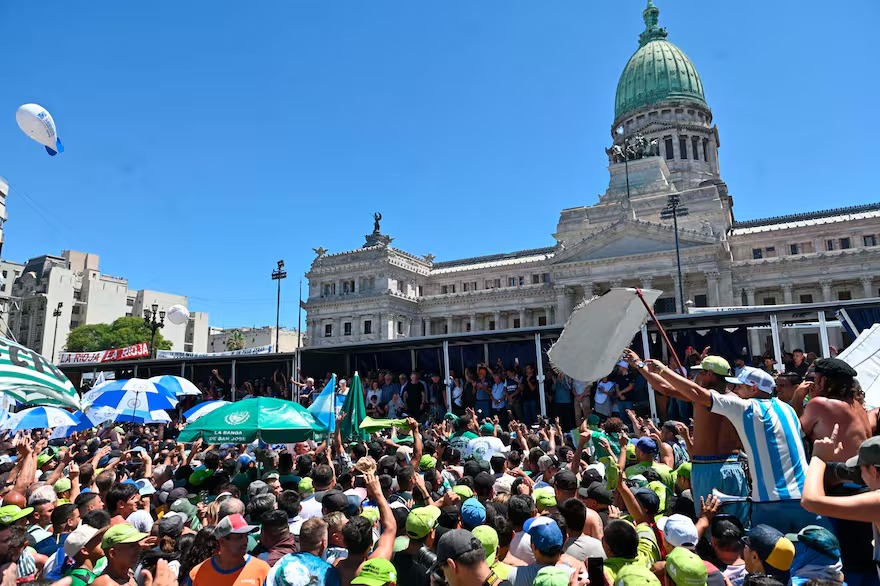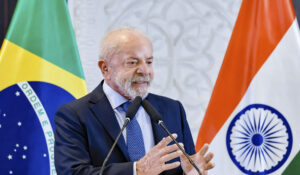
Published 10/04/2025 12:30 | Edited 11/04/2025 07:59
Argentina lives, this Thursday (10), its third general strike in just 16 months of Javier Milei government. Convened by the country’s leading trade union centrals, the stoppage denounces the social impacts of fiscal adjustment, requires increased wages and retirement and criticizes the new US $ 20 billion agreement with the IMF, about to be officialized.
More than 500 flights have been canceled, and sectors such as transportation, health, education and public services are paralyzed.
The mobilization is led by the General Confederation of Labor (CGT), the Argentina Autonomous Workers Center (CTA-A) and the Argentine Workers and Workers Center (CTA-T). Since a day before, thousands of workers, retirees and social movements have performed acts in front of the National Congress in Buenos Aires, denouncing the worsening of the social and economic crisis.
Unions warn of an explosive combination of unemployment, salary devaluation and budget cuts in essential areas such as health and education.
Trains, subway, maritime transport, post office, banks and hospitals interrupted their services, maintaining only urgent care. Although the bus drivers’ union has not fully adhered, public transport works with reduced capacity. Civil aviation was also affected: hundreds of flights were canceled throughout the Argentine territory.
The strike affects the main urban centers and occurs when the government faces growing popular wear. According to research institutes, support for Milei retreated between 5 and 10 percentage points since the beginning of the year.
Among the main claims are the resumption of collective bargaining, the end of the freezing of salary adjustments, the increase in pensions, the suspension of privatization and the reactivation of public investments. In addition, unions denounce mass layoffs in the public sector and the advance of imports, which weaken the national industry.
For the unionist Ernesto Quiqui of the World Union Federation (FSM Cone Southern), the Milei government cannot even be classified as neoliberal. “We are facing a neo -fascist government. Not only for the degree of repression, but because it seeks the total delivery of the country and its natural resources. It is a neocolonial project,” he told the Red portal.
Quiqui reports that, under the justification of fiscal adjustment, the government has cut free medications for retirees and cancer patients, frozen university budgets and tax reform that, although partially barred by the court, has been applied in various sectors.
“The government has reduced inflation, but at the expense of paying absolutely nothing,” he said. The policy of tightening, according to him, has generated severe losses for the working class and the popular sectors, while benefiting great capital.
The strike also fits into the context of Milei’s attempt to complete a new loan with the International Monetary Fund. The agreement provides for the transfer of US $ 20 billion, with a lack of four years and payment in ten. The government expects to receive up to 40% of the value in advance to contain the pressure on the exchange rate and renew foreign debt salaries.
However, economists warn that new indebtedness will hardly bring stability and that IMF’s requirements will only deepen social cuts. According to Quiqui, “workers and retirees continue to be the central targets of the adjustment.”
Despite the scenario of social deterioration, the FSM unionist points out that there are still weaknesses in the unit of the popular field. “There is no cohesive force of the workers’ movement today. But Milei is being struck by his own misfortune. Even part of the base that supported him in the elections begins to disappoint,” he says.
For him, the current moment can represent a historical opportunity for popular reorganization, driven by the mobilization of the working class in the face of deepening the social crisis.
“We know that this year there will be elections, and it is possible that many party structures try to channel this discontent. But it is essential that the working class takes on a role of protagonism in the construction of alternatives,” he said.
The strike takes place six months from legislative elections, when Mililei will seek to expand his base in Congress. The growing discontent among workers-including among former presidents of the president-can pave the way for a change in the correlation of forces. Unions are betting on wearing the government at the polls and the streets, barring a model that, according to them, destroys rights, expands inequalities and compromises national sovereignty.
Source: vermelho.org.br

